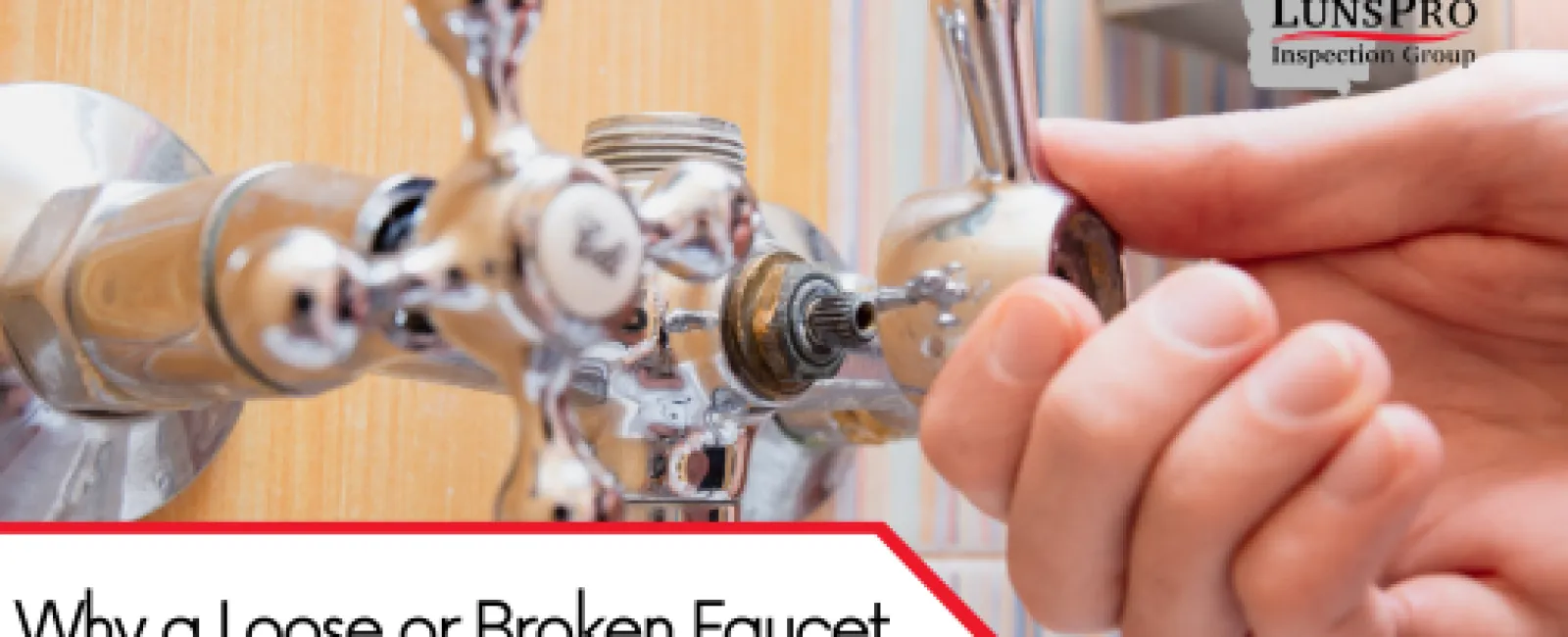A functional plumbing system is essential for the comfort and convenience of any home. From showers to sinks to tubs, plumbing fixtures are used daily—making them prone to wear and tear over time. While many homeowners expect occasional drips or leaks, issues with faucet handles often get overlooked until they become disruptive. A faucet handle that won't stay in place or falls back after being turned is more than an annoyance; it is a sign that something within the plumbing fixture is no longer working as it should.
During a recent evaluation by LunsPro Inspection Group, a certified inspector discovered a tub faucet handle that would not remain in position. This type of issue may stem from worn internal parts, loose fittings, or deeper plumbing concerns. Although it might seem minor at first, leaving a problem like this unresolved can lead to leaks, water waste, and costly repairs. That is why professional home inspections are critical for identifying these problems before they escalate.
This article explores the causes of loose faucet handles, the risks of ignoring them, and how residential and commercial inspections conducted by LunsPro protect homeowners from both inconvenience and hidden hazards.
How Tub Faucet Handles Work
A faucet handle is connected to internal components such as cartridges, stems, and valve seats, which regulate the flow and temperature of water. When the handle is turned, it opens or closes the valve, allowing water to flow through the spout. For tub faucets, these mechanisms must handle higher water volumes compared to sink faucets.
Over time, daily use can wear down these parts. If the handle no longer stays in place, the problem often lies in a loose set screw, stripped cartridge, or worn-out stem. In older fixtures, corrosion and mineral buildup can accelerate this process. What may begin as a handle that slips or falls back can eventually result in water flow that is difficult to control.
Common Causes of a Loose Faucet Handle
Worn Cartridge or Stem - The most frequent cause is wear on the cartridge or stem inside the faucet body. These components provide resistance and control; when they wear out, the handle slips.
Loose Screws or Nuts - Handles are usually secured with screws or nuts. If these loosen, the handle won't remain tight and may fall back after turning.
Stripped Splines - The ridges that connect the handle to the stem (splines) can wear down, making the handle unable to grip securely.
Age of Fixture - Older plumbing fixtures are more likely to experience this issue as parts wear out after years of regular use.
Water Pressure Issues - High water pressure can strain faucet components, contributing to premature failure.
Why This Small Issue Matters
While a loose handle may not seem urgent, it can have bigger consequences:
Leaks and Drips: A faulty faucet mechanism often fails to close completely, leading to continuous leaks. Over weeks or months, this wastes water and increases utility bills.
Water Damage: Persistent leaks can seep into walls, subfloors, and cabinetry, causing costly structural damage.
Mold and Mildew Growth: Damp areas created by leaks become breeding grounds for mold and mildew, which negatively impact indoor air quality.
Fixture Failure: If ignored, the handle or faucet may eventually fail completely, requiring full replacement rather than a simple repair.
Hidden Plumbing Concerns: A slipping handle can sometimes signal deeper issues within the plumbing system, such as mineral buildup or deteriorating pipes.
The Role of Home Inspections in Catching Faucet Issues
Plumbing problems are among the most common issues uncovered during home inspections. Inspectors from LunsPro Inspection Group test faucets, sinks, tubs, and showers as part of their evaluations. When a faucet handle is loose, inspectors note it in their detailed reports, highlighting the need for repair.
For buyers, this information is valuable when negotiating with sellers, as small plumbing problems can add up quickly. For sellers, addressing these issues before listing a property helps present the home as well-maintained and ready for market. For current homeowners, inspections provide peace of mind that small concerns like a faucet handle won't turn into hidden water damage.
Plumbing in Georgia Homes: Why It Matters Locally
Homes across Georgia—whether in Atlanta, Alpharetta, Athens, or surrounding areas—feature a wide range of plumbing systems depending on age and construction style. Older homes may have original fixtures that are now outdated, while newer homes often include modern cartridges that, while efficient, can wear out with frequent use.
A tub faucet handle that doesn't stay in place may seem like an isolated problem, but in many Georgia homes, it reflects the overall condition of the plumbing system. By relying on LunsPro's residential and commercial inspections, homeowners gain a clear understanding of their property's current plumbing health.
How to Address a Broken or Loose Faucet Handle
When a problem faucet is discovered, repairs can range from simple adjustments to full fixture replacement:
Tightening Screws: Sometimes, a loose handle is simply due to a screw that has worked its way loose. Tightening it may solve the issue.
Replacing the Cartridge or Stem: For more severe wear, replacing internal components restores function.
Upgrading the Fixture: If the faucet is old or extensively worn, replacing the entire unit is often the best long-term solution.
Professional Plumbing Service: A licensed plumber can quickly diagnose whether the issue is isolated to the handle or part of a larger plumbing problem.
Preventing Future Plumbing Problems
To extend the life of plumbing fixtures and avoid problems like slipping handles, homeowners should:
Regularly check for signs of wear or leaks.
Maintain consistent water pressure in the home.
Flush plumbing systems periodically to reduce mineral buildup.
Replace aging fixtures before they fail completely.
Schedule periodic home inspections to monitor the overall condition of plumbing systems.
Why LunsPro Inspection Group is the Trusted Choice
What sets LunsPro Inspection Group apart is their commitment to thorough, detail-oriented evaluations. A faucet handle that won't stay in place may appear insignificant, but inspectors know it can indicate larger concerns. By identifying these issues during residential and commercial inspections, LunsPro provides homeowners with actionable insights that prevent costly surprises later.
Their team of certified inspectors serves communities across Georgia, delivering trusted home inspections that emphasize safety, functionality, and long-term property value.
A tub faucet handle that falls back or refuses to stay in position is more than just a nuisance. It often signals wear within the plumbing system that, if left unresolved, can lead to leaks, wasted water, and even hidden damage. For property owners, catching these problems early is key to avoiding costly repairs.
Through detailed home inspections, LunsPro Inspection Group ensures that even small concerns like a broken faucet handle are properly documented. Their comprehensive approach to residential and commercial inspections empowers Georgia homeowners with the knowledge needed to protect their investments, maintain safe living spaces, and plan for repairs with confidence.
Small details matter—and when it comes to home maintenance, addressing them today prevents bigger headaches tomorrow.

